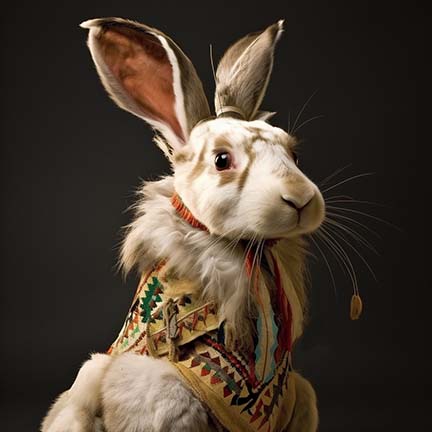
I grew up with Nanabozho. He played by no one's rules. He fixed things. He destroyed. Though it may have cost me my childhood innocence, he taught me what it meant to be alive in a mad world.
You may be familiar with Loki or Coyote, a plethora of different versions of the trickster, but they all serve as a catalyst for change, upending the status quo, marching to the beat of their own drum. They occupy the vast chasm between good and bad. And we need them.
We need stories where one clever character outwits everyone, revealing truths we refused to see. We need to experience change and growth without knowing whether to bless or curse the cause. Only the trickster faces the chaos and challenges of life and always adapts. Every version of the trickster embodies resiliency and the ability to overcome the most unlikely odds.
Nanabosho
At nineteen years old, I mentioned my grandfather's missing thumb to my mother. As I understood, it had been bitten off by a rabbit. My memories of chasing those dangerous rabbits through my grandparents' garden testify to my profound gullibility-both as a child and often still today. During my sweet years of supreme naivety, I didn't recognize why my grandfather chuckled as he left the chase. He abandoned me, on my knees, crawling up to the bushes searching for the rabbit that bit off his thumb.
"Your grandpa was a logger. He cut it off in a saw mill," my mother moaned in disgust.
If I hadn't known Nanabozho was a rabbit and a trickster, I might not have gotten the joke. But, by that time the old man looked like an empty shell, a felled tree, and not the powerful lumberjack he had been. I couldn't tell him the ruse was over--he'd succumbed to dementia and was gone. He would have been 120 this year.
Tricksters make fools of us all, which humiliatws the proud. But, they also teach moral lessons in the most joyfully irreverent way. Perhaps, I hadn't considered that my grandfather would lie or that he would take his joke to his deathbed. My grandfather brought the rabbit, Nanabozho, manifest in all its paradoxical glory, firmly into my life in the most memorable fashion. It was in these years as well, my father would sit me down at the kitchen table-often unwillingly, load his wooden pipe, and recite myths of creation from our cultural heritage as people indigenous to the plains. Nice, but as exciting as church service after the first few hours. While my father could recall a dozen stories that told me who the Nanabozho was--my grandfather showed me Nanabozho.
In these times when I see people so confused about the direction the world is headed, I have to ask myself why the trickster makes us so uncomfortable. While researching archetypes for The Handbook of The Writer Secret Society, I dreamed the trickster found me. Grinning wildly with sparkling eyes, it took form in my dream only to show me that no matter how clever I felt, it could do as it pleased--an untamable, unpredictable force. Around every corner, never leaving for long. Blessings or curses. You don't know. I don't know. We can't know. But, his mayhem shapes is into better versions of ourselves and we eventually accept that it's not in our control.
The personification of chaos cannot be predicted or molded by judgements of right and wrong. The trickster prepares us for this unpredictable world. He reveals the fundamental truth, like a natural law, that you just have to deal with uncertainty and ambiguity. He humbles us. He shows us we can adapt, endure, and let go. We are tempered in strength by his visits.
You may read this post as an unrequited love letter to this oft misunderstood archetype. I admit my affection for this crazy rabbit. He's the original Bugs Bunny. You can't help, but love him. Only the truly foolish deny the relevance of his lessons or that it's easier to embrace him than fear the furry little rascal.

1 comment
Interesting view from the eyes of a young girl. Bugs Bunny is the ultimate anti-hero-hero and every culture has a name for him.